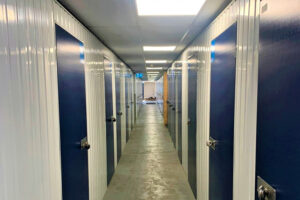Unlocking the Potential: The Rise of Business Self Storage

The business world is always changing, with a number of different elements influencing how companies operate. Among these, one often overlooked factor is how businesses manage their space.
Office premises are cluttered, overflowing storage rooms become the norm, and the luxury of space seems increasingly scarce.
Enter the concept of business self-storage – a solution that not only addresses these concerns but provides a multitude of other benefits.
A report by Cushman & Wakefield showed that the UK’s self-storage industry grew by 8% in 2021, demonstrating a growing understanding of the benefits self-storage offers.
These aren’t just additional rooms to store surplus office supplies. Instead, they offer businesses the flexibility to manage space in a way that aligns with their ever-changing needs.
From startups grappling with tight budgets to established corporations handling large inventories, self-storage is becoming a strategic solution for efficient space management.
In the UK, the Self Storage Association reports (as of 2021) that there are now over 1,582 self-storage sites offering a total of 44.6 million square feet of storage space. This highlights the growing market and acceptance of self-storage as an effective business tool.
But what triggered this growth, and what are the advantages businesses can derive from it?
This blog post delves into these aspects and more. We will explore the evolution of the self-storage industry, the unique benefits it offers, its adaptability to various industries, and guide you through the process of choosing the ideal business self-storage solution.
In the next section, we will look at how self storage is a strategic business solution.
The Evolution of Business Self Storage

In its infancy, self storage was largely viewed as a personal solution – a place where homeowners could safely store their belongings while transitioning between homes, or to declutter their living space.
Over the years, however, the industry witnessed a significant shift, with businesses realising the immense potential and versatility of self storage units.
The Self Storage Association UK reports (as of 2021) that 42% of all self storage space is now rented by businesses. This signifies the growing recognition of self storage as a commercial solution. But what prompted this transition?
Changing Business Landscape and Rise of E-commerce

The traditional brick-and-mortar business model saw a dramatic shift with the advent of the internet. The rise of e-commerce revolutionised the retail industry, enabling businesses to reach a global audience from a single location.
However, it also brought forth new challenges, particularly in terms of inventory management.
Businesses needed space to store their expanding inventory. Traditional warehousing solutions were not only expensive but lacked the flexibility that e-commerce businesses demanded. Self storage offered a practical solution – cost-effective, flexible, and secure storage spaces.
Increasing Real Estate Prices
In cities across the UK, real estate prices have been on a steady upward trajectory. For businesses, this meant escalating overhead costs. Downsizing their operational premises and opting for self storage became an effective strategy to cut costs without compromising their business operations.
The Need for Flexibility
The business landscape is dynamic, with demand patterns fluctuating. Seasonal businesses, for example, see a massive surge in inventory during certain times of the year. Self storage, with its flexible rental terms, emerged as a perfect fit for such businesses. They could easily upscale or downscale their storage space according to their business cycles.
Adapting to the Pandemic
With businesses scrambling to adapt to remote working protocols, the need for secure document storage and equipment storage skyrocketed. Self storage facilities stepped up, offering businesses a safe place to store their resources.
The evolution of self storage into a commercial solution is a classic example of an industry adapting to the changing needs of its consumers. It tapped into the unique challenges businesses faced and offered a solution that was not just about storing, but strategically managing space.
As we move to the next section, we will delve deeper into the various benefits that self storage offers to businesses.
Benefits of Business Self Storage

The advantages of business self storage extend far beyond the evident benefit of additional space. They are multi-faceted, offering a range of solutions that contribute to various aspects of business operations.
1. Cost-Effectiveness
Renting commercial premises or warehouses for storage comes with a hefty price tag. According to Statista, the average rental cost of industrial space in London was £16.3 per square foot per annum in 2021.
This cost can be significantly reduced with self storage units. With flexible plans, businesses pay only for the space they need and the duration they use it for, offering considerable savings.
2. Flexibility
Business needs change – sometimes gradually, sometimes overnight. Business self storage offers flexibility in terms of space and duration, allowing companies to easily upscale or downscale their storage needs.
Be it a sudden spike in inventory, a business relocation, or a need for temporary storage during office renovations, self storage caters to it all.
3. Security
Self storage units offer robust security measures. These include 24/7 CCTV surveillance, individual unit alarms, secure locks, and in some cases, on-site personnel.
This makes them a safe place for businesses to store their inventory, equipment, or confidential documents.
4. Ease of Access
Businesses have round-the-clock access to their self storage units, ensuring that they can reach their inventory or supplies whenever needed. This is particularly beneficial for e-commerce businesses that operate beyond traditional working hours.
5. Better Space Management
Cluttered work environments can negatively impact productivity. By moving non-essential items and paperwork into a storage unit, businesses can create more streamlined workspaces. It also provides a more professional appearance for visiting clients or business partners.
6. Business Expansion
For small businesses and startups, self storage units can facilitate business expansion. Rather than investing heavily in larger premises as the business grows, they can rent additional storage units. This allows businesses to grow at their own pace without being burdened by substantial real estate costs.
7. Disaster Recovery
In the event of unforeseen circumstances such as fire or flooding, having a secure off-site storage space can be a part of a solid disaster recovery plan. Businesses can safely store back-up equipment, files or inventory, ensuring business continuity.
The benefits of business self storage are compelling, and it’s no surprise that an increasing number of businesses are turning to this solution.
However, the effectiveness of self storage also depends on how businesses utilise it.
In the next section, we’ll discuss various industry-specific use cases of self storage, offering a more nuanced understanding of its applications.
Industry-Specific Use Cases

The flexibility and adaptability of business self storage make it suitable for a wide range of industries. Let’s delve into how different sectors are leveraging these facilities to enhance their operations.
1. Retail
For both brick-and-mortar and online retailers, managing inventory is a major challenge. Retail businesses typically deal with fluctuating demand, with significant increases during seasonal peaks.
A self storage unit allows them to store additional stock during these periods and retrieve it as needed. It can also serve as a centralised distribution point for online retailers.
2. Construction
Construction companies frequently deal with bulky equipment and materials, which need secure storage. With the flexibility to choose the size of their self storage unit, these businesses can safely store their equipment, tools, and materials without cluttering their operational site.
3. Real Estate
For real estate businesses, especially those involved in property management, self storage can be beneficial. They can use it to store furniture and other items from their managed properties. In the case of home staging, these units can be used to store decor items and furniture.
4. Event Management
Event management companies work with a wide range of equipment and props, which may be used only a few times a year. A self storage unit provides a secure and easily accessible space to store these items when not in use.
5. Restaurants and Cafes
For the hospitality sector, storage space is often a luxury. Restaurants and cafes can use self storage units to store excess non-perishable inventory, dining sets, seasonal decor, and more. It allows them to keep their premises uncluttered, thereby offering a better customer experience.
6. Professional Services
Law firms, accounting firms, and similar professional service providers deal with a large volume of documents. With legal requirements to retain certain documents for a number of years, these businesses can quickly run out of storage space.
Self storage units offer a secure and accessible solution to store these critical documents.
7. Arts and Entertainment
Artists, photographers, and filmmakers often require storage for their works, equipment, and props. Self storage units, especially climate-controlled ones, provide the perfect environment to store such items without the risk of damage.
These industry-specific use cases highlight the versatility of business self storage. It is a solution designed to meet diverse needs, adapting to the unique demands of different industries.
However, the effectiveness of a self storage solution depends on choosing the right facility. In the next section, we’ll guide you through the process of choosing an ideal business self storage solution.
How to Choose the Right Business Self Storage

Selecting a self storage facility for your business requires careful consideration. A facility that aligns with your business needs can significantly enhance your operations.
Here are some key factors to consider while choosing a business self storage solution:
1. Size
Estimate your storage needs accurately. This will largely depend on the type of business you run and what you intend to store. Storage units come in various sizes, and having an understanding of your requirements will ensure you don’t pay for space you don’t need.
2. Location
Consider the proximity of the storage facility to your place of business. If you will need frequent access to your stored items, a facility close to your business location would be ideal.
However, if you don’t need regular access, you might find more competitive rates a bit further afield.
3. Security
Check the security measures in place. This is crucial if you intend to store valuable inventory or confidential documents. Good security measures include CCTV surveillance, individual unit alarms, and secure locks. Some facilities may also offer on-site security personnel.
4. Access Hours
Ensure the facility’s access hours align with your business needs. Some facilities offer 24/7 access, while others have specific operating hours. If your business operates outside of traditional hours, consider a facility that offers round-the-clock access.
5. Climate-Controlled Units
If you’re planning to store items that are sensitive to temperature or humidity, such as artwork, electronics, or certain types of inventory, you’ll need a climate-controlled unit. This feature helps to maintain a steady temperature and humidity level in your storage unit, protecting your items from damage.
6. Pricing and Contract Terms
Compare prices and contract terms of different facilities. Be aware of any hidden costs such as deposits, late payment fees, or mandatory insurance. Flexible contract terms can be beneficial if your storage needs fluctuate.
7. Reviews and Reputation
Lastly, look at reviews and the reputation of the storage facility. This can give you a better idea of their customer service, the cleanliness of the facility, and the overall experiences of other businesses.
Choosing the right business self storage solution can provide your business with the space it needs to operate efficiently and effectively.
It can be an instrumental part of your business strategy, allowing you to focus on growing your business while it takes care of your space management.
Wrapping Up
In an ever-evolving business landscape, the need for adaptive and efficient solutions is super important.
This has paved the way for self storage to emerge from the sidelines and establish itself as a strategic tool for businesses.
With its cost-effectiveness, flexibility, and robust security measures, self storage is becoming the go-to choice for businesses seeking better space management.
The statistics speak volumes of the potential of self storage. In the UK alone, 42% of all self storage space is now rented by businesses.
From e-commerce retailers and construction companies to professional service providers and the hospitality sector, businesses across various industries are leveraging the benefits of self storage.
The role of self storage has grown beyond merely offering additional space. It’s about providing a solution that aligns with the dynamic needs of businesses. It offers the possibility to downscale or upscale quickly, allows for better workspace organisation, and even serves as a secure haven in the face of unforeseen circumstances.
Choosing the right self storage unit can significantly enhance your business operations. By considering factors such as size, location, security measures, access hours, climate control, pricing and contract terms, and the reputation of the facility, businesses can find a self storage solution that perfectly suits their needs.
The future of business operations is efficient, flexible, and strategic, and self storage is emerging as a key player in this future. As businesses continue to explore and utilise these facilities, the self storage industry stands poised for further growth and evolution.
And as we navigate through this change, one thing is certain – business self storage is not just about creating space; it’s about creating opportunities for businesses to thrive.